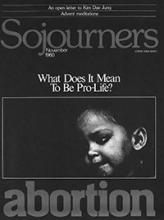Phil and I have two children: Frida, age 6, and Jerome, age 5. They are one year and two weeks apart. Neither child was "planned." It always seemed to us that to decide to have children was a measure of control over life, a control not too alien from the tendency to dominate that we so ardently resist in our culture. To us, the decision seemed to diminish one's ability to see oneself as steward, to see one's children as a gift of God that we were asked to nourish into man- and womanhood in a spirit of reverence rather than of ownership.
Neither Phil nor I could in conscience either plan our children or take any measures beyond abstinence to limit them. This conscience was formed on the conviction of the sacredness of life.
Having said this, I am yet far from the popular definition of pro-lifer. With few exceptions I find that movement to be anti-abortion and so to be without respect to the feminist, economic, military, and moral realities around us.
My conscience has not led me to be a spokesperson against abortion. I have no problem sharing with others the content of that conscience. But I am compelled rather to address what to me appears to be the source of the problem morally. My view is articulated well in the popular poster quoting Dick McSorley, S.J.: "The taproot of violence in our society today is our intent to use nuclear weapons....Until we squarely face the question of our consent to use nuclear weapons, any hope of large scale improvement of public morality is doomed to failure."
I believe our culture is morally bankrupt. And I don't think it right or just to put the burden of transforming our moral values as a people onto the shoulders of young women who are, in most respects, victims of those values--being women and thus objects; being poor and thus a burden; being members of a society where the military and leadership have gone mad, and being thus expendable.
Read the Full Article

